Volunteers needed for COVID-19 booster trial
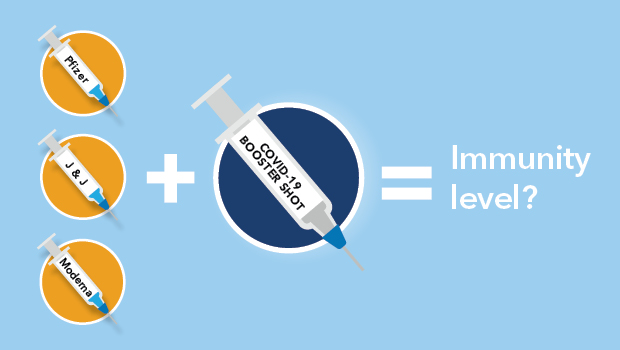
NIAID-sponsored study includes Seattle in test for benefits of mixing different vaccine types
Kaiser Permanente Washington Health Research Institute (KPWHRI) is recruiting volunteers in the Seattle area for a national clinical trial funded by the National Institutes of Health (NIH) exploring the possible benefits of pairing doses from different COVID-19 vaccines.
In the new study, KPWHRI and 8 other research centers in the Infectious Diseases Clinical Research Consortium (IDCRC) will assess the use of different boosters that may or may not match the type of vaccine that participants received earlier. The researchers aim to determine the safety and effects of mix-and-match boosters on immunity to SARS-CoV-2, the coronavirus that causes COVID-19.
“The question is whether giving different types of COVID-19 vaccines can induce a more effective immune response,” said Lisa A. Jackson, MD, MPH, who is leading the trial at KPWHRI. “In research on other infectious diseases, we have discovered that mixing vaccine types can lead to stronger immunity, so it makes sense to examine how it might work for COVID-19.”
How the study will mix-and-match vaccines
This clinical trial is currently slated to enroll approximately 400 healthy individuals ages 18 and older in the United States and will comprise 2 cohorts:
- One includes adults age 18 and older who have not received any COVID-19 vaccine. That group will first receive 2 doses of the Moderna-mRNA-1273 vaccine, which has received FDA Emergency Use Authorization, and then about 3 months later, will receive a booster of a different COVID-19 vaccine. As the trial launched, researchers aimed to find 250 participants for this cohort.
- The other group includes adults age 18 and older who have been fully vaccinated within the past 5 months with a COVID-19 vaccine that has received FDA Emergency Use Authorization (2 doses of Pfizer or Moderna vaccine or 1 dose of Janssen/Johnson& Johnson). These participants will receive a booster dose of the Moderna-mRNA-1273 vaccine. Researchers currently plan to recruit 150 participants for this cohort.
To gauge the potential efficacy, researchers will test how the different matches of vaccine and booster affect the levels of antibodies that help to produce an immune response to the coronavirus. The study will also track adverse events to assess the safety of the different pairings.
The need for boosters depends, in part, on whether the immune protection afforded by COVID-19 vaccines fades over time. Boosters may also be useful if new variants of the coronavirus arise that current vaccine regimens are less effective against.
“It will be awhile before we know whether protection from the vaccine is seriously diminished with a longer duration of time from completion of the primary shots, but we certainly are getting prepared for boosters by doing this trial,” said Dr. Jackson, who oversaw the launch of the first trial in March 2020 to test the COVID-19 Moderna vaccine, and also helps run phase 3 trials of that vaccine and the Johnson & Johnson vaccine. Under her direction, KPWHRI is also participating in a phase 1 trial of a new vaccine designed to counter the coronavirus variant first identified in South Africa.
Participating in the trial
The trial requires that participants make as many as 9 visits over the course of a year to the KPWHRI research clinic in downtown Seattle. In appreciation of their time and effort, people who participate in the study will receive $75 for each study clinic visit that they complete.
Seattle-area residents who are interested in being contacted about current and future COVID-19 vaccine studies can join the KPWHRI vaccine registry at https://corona.kpwashingtonresearch.org/. Additional information about the trial is available here on the clinicaltrials.gov website, maintained by the National Library of Medicine at the National Institutes of Health.
The study is being conducted by the Infectious Diseases Clinical Research Consortium (IDCRC) in collaboration with the National Institute of Allergy and Infectious Diseases, part of the National Institutes of Health. The co-principal investigators of the trial are Robert Atmar, MD, professor of infectious diseases, Baylor College of Medicine, and Kirsten E. Lyke, MD, professor of medicine, University of Maryland School of Medicine.
The trial is slated to run through 2025, though preliminary results may be available in several weeks. New arms may be added to the trial to test how the Moderna booster works with other vaccines that receive FDA emergency use authorization in the coming months.
In addition to KPWHRI, the other participating IDCRC sites are Baylor College of Medicine Vaccine and Treatment Evaluation Unit (VTEU); University of Texas Medical Branch at Galveston, subsite of Baylor VTEU; Cincinnati Children’s Hospital Medical Center VTEU; Emory University VTEU; University of Rochester VTEU; New York University VTEU; University of Washington VTEU; and University of Pittsburgh, subsite of Vanderbilt VTEU.
The IDCRC, consisting of the VTEUs and the IDCRC Leadership Group, was formed in 2019 to support the planning and implementation of infectious diseases clinical research that efficiently addresses the scientific priorities of NIAID.
“Thanks to the generosity and commitment of our volunteers, we will be advancing the science needed to prevent illness and death from COVID-19,” said Dr. Jackson. “None of this work would have been possible without the NIAID’s vision to establish a network of vaccine research centers that can respond to pandemic threats.”
This story is adapted from a news release by Infectious Diseases Clinical Research Consortium and written by Jonathan Rabinovitz.
Research
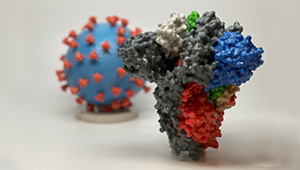
COVID-19 pandemic research at KPWHRI
Having long tracked infectious diseases and tested vaccines, KPWHRI now focuses on the novel coronavirus.
Vaccines
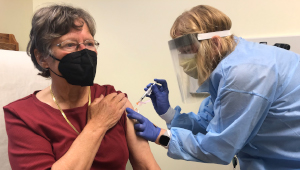
COVID-19 variant vaccine trial begins at KPWHRI
An investigational vaccine by Moderna is being tested for safety and immune response in Seattle and 3 other cities.
1st vaccine shot
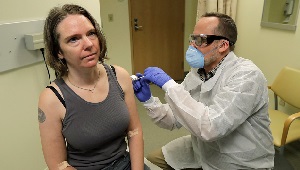
COVID-19 vaccine trial volunteer on the shot heard 'round the world
On March 16, 2020, Jennifer Haller became the first person to be injected with a COVID-19 vaccine in a clinical trial.
Research
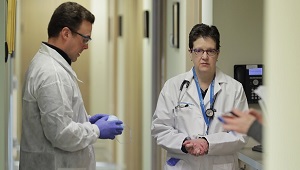
‘Fighting back’ against COVID-19: Remembering a historic trial
Lisa Jackson, MD, MPH, Kaiser Permanente Washington senior investigator, recounts the genesis of a groundbreaking vaccine.
News
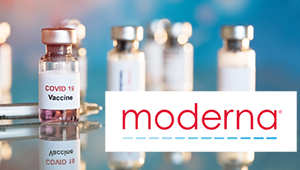
NIH-Moderna COVID-19 vaccine receives FDA Emergency Use Authorization
The investigational vaccine that KPWHRI’s team first tested shows an efficacy rate of about 94% as research continues.



